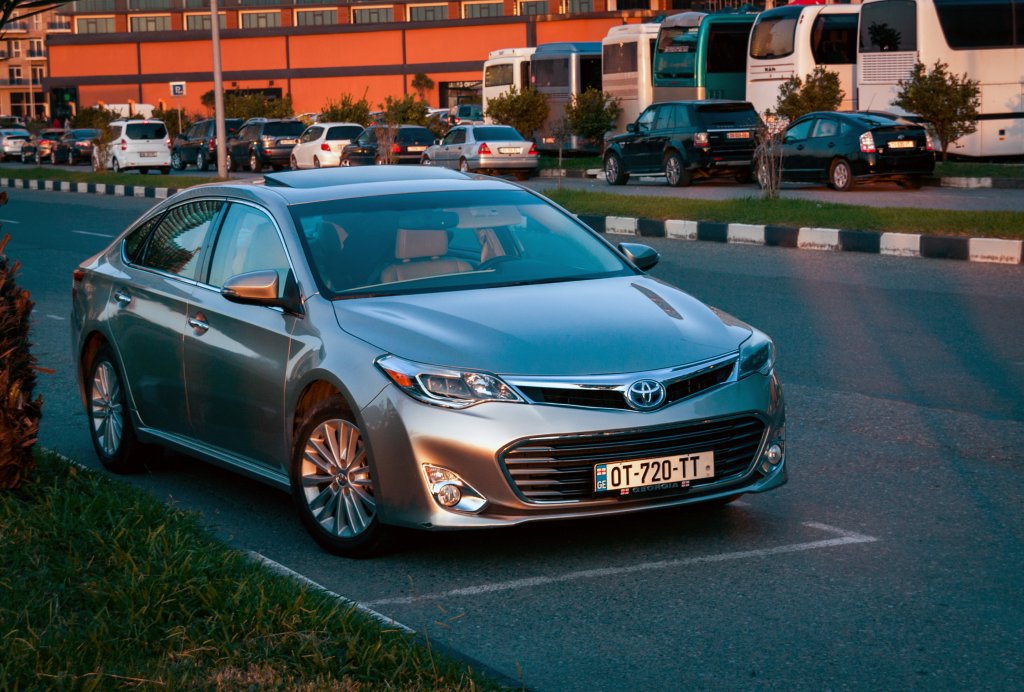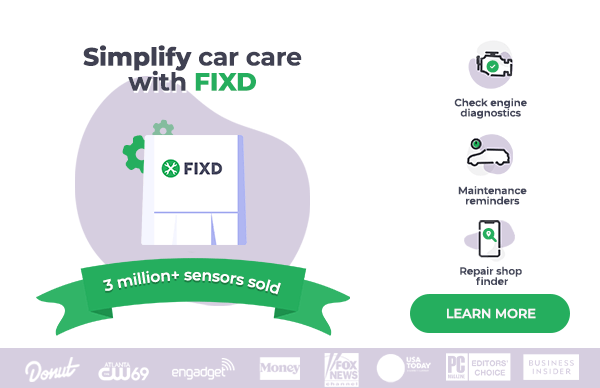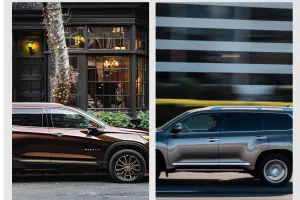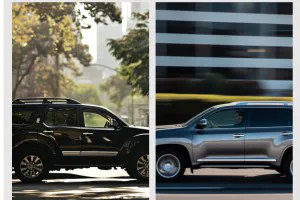The Toyota Avalon is the largest full-size sedan made by the Japanese automaker. It was in production in the United States from 1995 until it was discontinued in 2022. More than two million Avalon models were sold in the U.S. before it was axed from the lineup. The most popular model years were the 2000 model, as well as the 2005 and 2006.
It would be unwise to buy a used Toyota sedan without first considering which Avalon models are considered among the best and worst. We offer up tons of compiled data to help you evaluate how each model year competes against the others. With this data, you can also plan when to sell your used Avalon to make the most money.
These data and reliability rankings are sourced from the thousands of FIXD car scanners owners installed in their Toyota Avalon sedans. We use this information in conjunction with survey results from the owners. While you can learn a lot from these two pieces of information, we also add in the safety ratings, KBB values, fuel economy numbers, recalls, and much more so you have a clearer picture.
|
Best Years |
Why? |
|
Impressive reliability ratings, good fuel economy rating, minimal chance of expensive repairs |
|
|
Great owner satisfaction scores, low cost of ownership |
|
|
Superior owner reliability ratings, minimal cost of maintenance and repairs |
|
|
Loved by owners, minimal chance of expensive engine or transmission repairs |
|
Worst Years |
Why? |
|
Lower reliability ratings, increased likelihood of engine trouble |
|
|
Average reliability scores, higher chance of expensive engine, transmission, and brake repairs |
|
|
Average reliability ratings, higher cost of ownership, increased trouble with brakes |
|
|
Mediocre reliability ratings, slightly elevated risk of expensive repairs |
Toyota Avalon Engine Reliability Score, Safety Ratings, MPG, and Value v.s. Maintenance & Repair Costs – Year by Year
We hold nothing back when we show you the data we have on the Toyota Avalon. With our simplified charts, you can quickly see the ratings or look at the more detailed breakdown of each model year. There’s enough transparency for you to know which Toyota Avalon model best suits you. Jump ahead and take a look at each model separately, or take your time and sift through all the data. We reveal the owner scores, fuel economy ratings, average maintenance estimates, safety rankings, and reliability information.
You may also consider the Toyota Corolla or Toyota Camry, which are the brand’s other sedans. Or, you could look at the competition with the Nissan Maxima.
If you’re in the market for a car, take a look at our article on the USA’s most reliable and cheapest to repair cars in the U.S. Don’t get stuck with a lemon, use our data to help you shop.
Engine Reliability Score – Over The Years
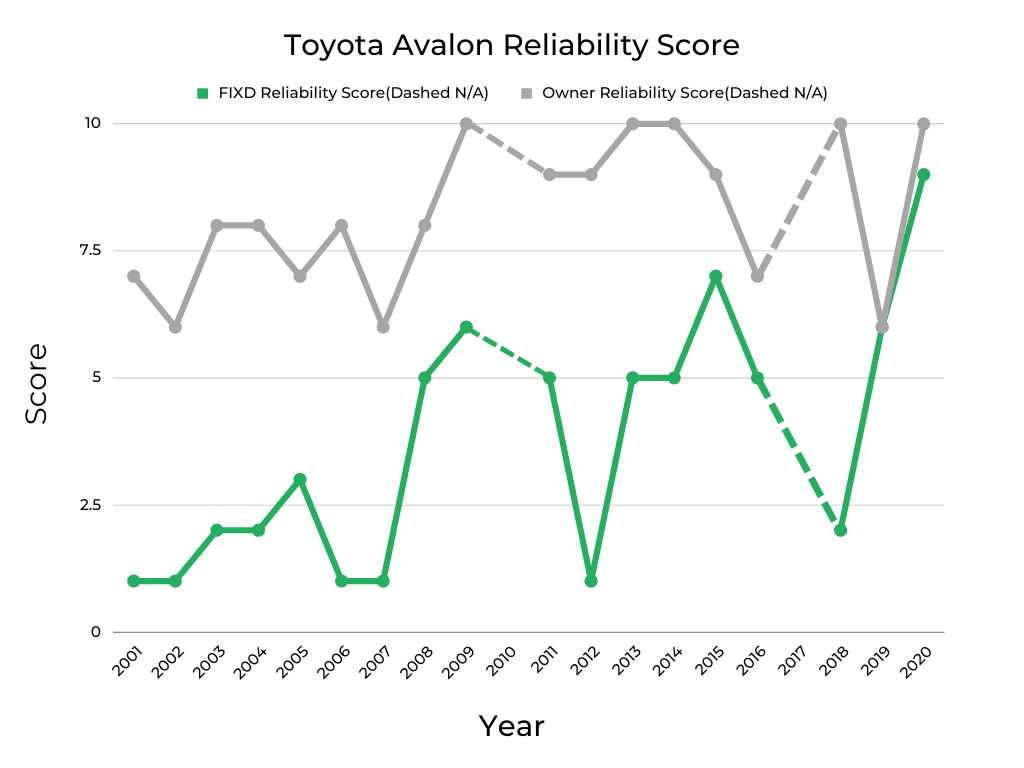
We want you to see reliability on a larger scale. For that reason, we look at two determining factors (FIXD app data and owner reports) to give you an overall ranking. With our ratings, we made this chart for you to easily compare the two scores. This graph includes the following information:
- The FIXD Reliability score (Green line) – we pulled this data from the check engine lights set by Toyota Avalon sedans over 12,000 miles of driving (1 year’s worth of driving).
- The Owner Reliability score (Gray line) – these survey answers are from Toyota Avalon owners.
Our reliability score runs from 1 to 10. We use the same scale on all Toyota Avalon models. Scores of 10 are considered the best, with 1 showing as the worst. If you see a rating of 5, that would be considered average.
The newer the sedan is, the more reliable they tend to be. However, we had to remove the 2010 and 2017-2018 Avalon models from our rankings because of a lack of data. With a few more respondents on these models, the rankings could be different.
Look through all of the reliability data, combined with the other figures, to determine which Avalon model fits you best in your target price range.
We also encourage you to read Toyota Check Engine Light | Top 5 Causes for Each Model before you choose one to buy.
NHTSA Safety Score – Over The Years
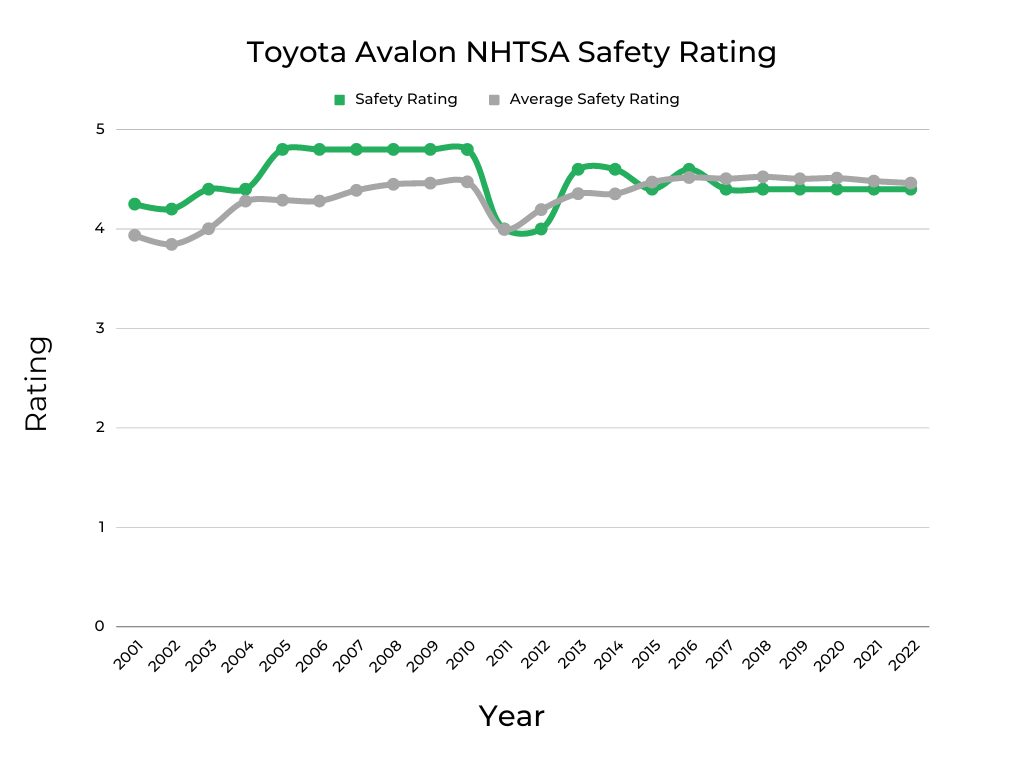
The National Highway Transportation Safety Administration (NHTSA) is a federal agency setting average safety scores for the majority of passenger vehicles on the road today. These scores set which vehicles are the best choices for families and which ones aren’t ideal options.
The average safety scores we have for the Toyota Avalon are graphed above. The green line reveals average scores for the Avalon sedans, while the gray line shows average scores for all of the vehicles we have collected data on.
Most of the Toyota Avalon models hit either the average score or higher, except for the 2012, 2015, and 2017 or newer. Yet, none of these miss the mark by much.
To ensure you get cheap car insurance for your used sedan, it’s better if you pick a model year with better safety ratings.
If you live in one of the states listed below, we can show you the cheapest vehicles to insure in yours.
| What Used Cars Are the Cheapest To Insure In: |
| Ohio |
| North Carolina |
| Michigan |
| Georgia |
| Texas |
| New York |
| Illinois |
| Pennsylvania |
| California |
MPG – Over The Years
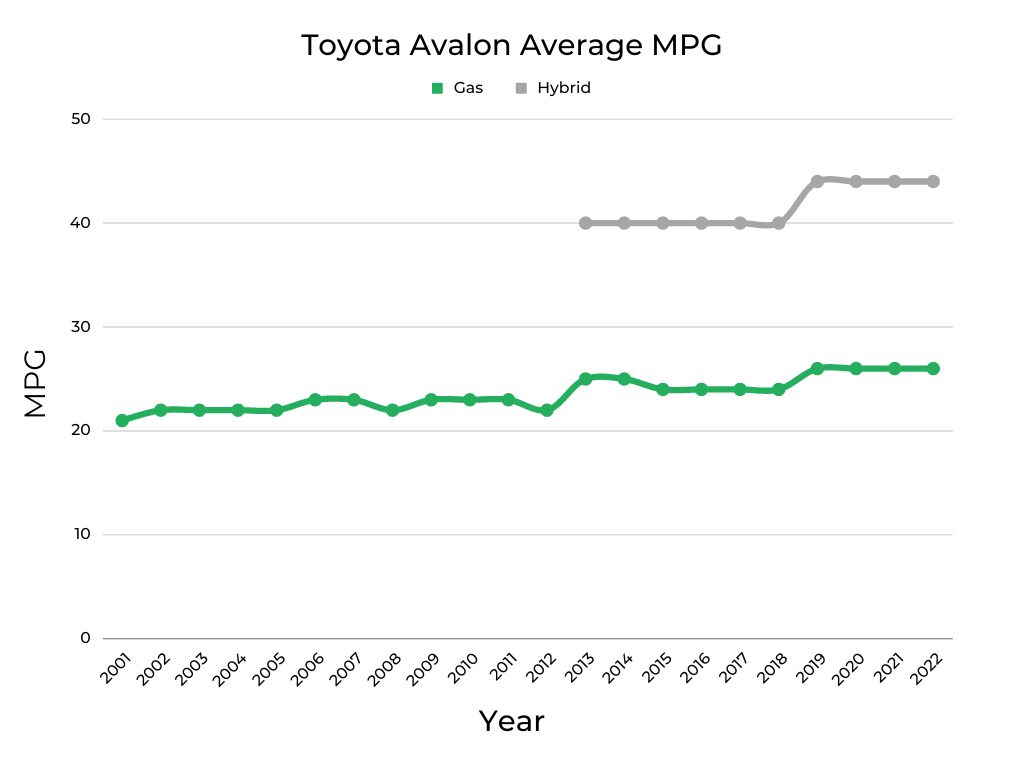
The Toyota Avalon is a sedan meant to provide a fuel-efficient yet enjoyable commute. Therefore, the manufacturer was able to improve fuel economy numbers without sacrificing necessary performance. If you want to save money at the pump, it’s best to choose one of the more fuel-efficient model years.
Our graph reveals the average Toyota Avalon fuel economy rankings by model year. We used the information found at fueleconomy.gov. The green line shows the gas-powered models with an average of all trim levels and equipment. The gray line is the hybrid rankings. Based on this information, the best fuel economy is found in the 2019-2022 Toyota Avalon models in their respective gas and hybrid classifications.
Current Market Value of All Toyota Avalon Years & Cost Per Year to Repair and Maintain Each
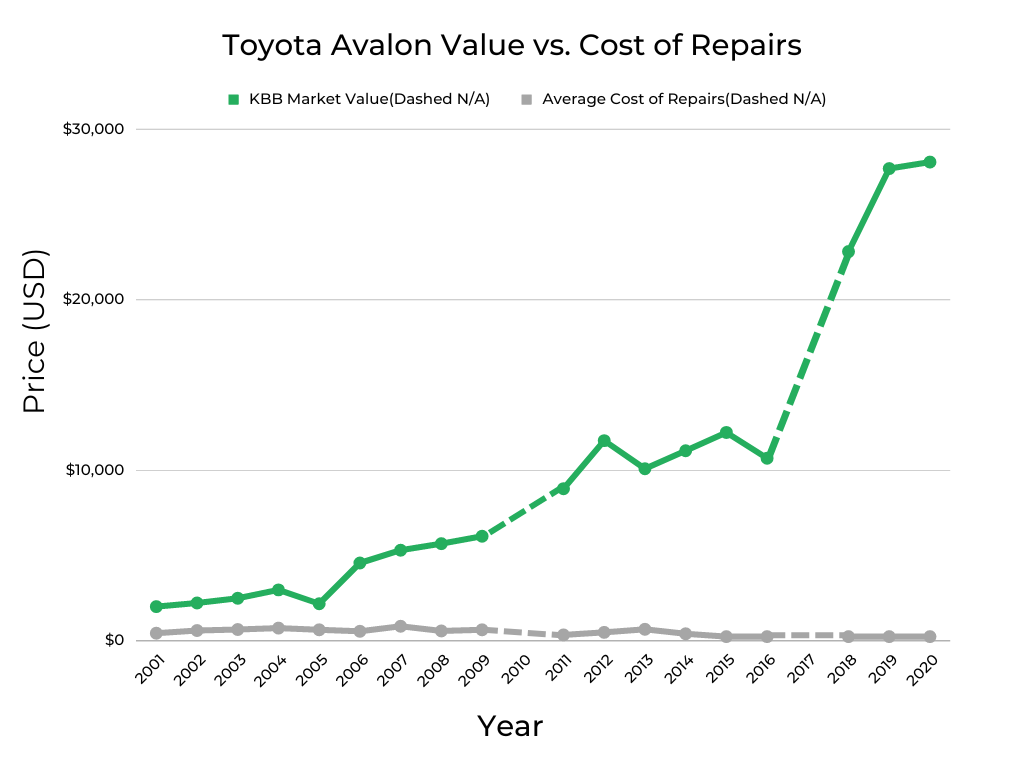
Some Toyota Avalon models still carry a hefty price tag, even though the car has been discontinued. However, some model years are considered a real bargain and can be chosen if you need to save money. The resale value depends mainly on the model year, trim level, chosen features, and mileage on the odometer. That’s why we always recommend running a KBB value report before buying or selling any used car.
Less reliable model years can also see a drop in resale value. No one wants a car with a lot of mechanical issues. Therefore, you need to be careful not to buy an older Avalon that needs a lot of maintenance or repairs because it may not be worth fixing.
If you struggle to decide between two Avalon models that are closely related age-wise, consider choosing the newer option if it’s reliable. It will probably have more upgraded features and it could last longer overall.
When shopping for a used Toyota Avalon, it’s important to keep in mind that not all vehicles are cared for equally. To protect yourself from lemons, take along a FIXD Sensor on your test drive. FIXD connects to a free app on your smartphone to tell you more about the vehicle you’re checking out, including check engine lights and other hidden issues that the owner or dealership may be attempting to hide. Click here to learn more and get FIXD for only $19.99 (regular price $59)!
Important Features Timeline
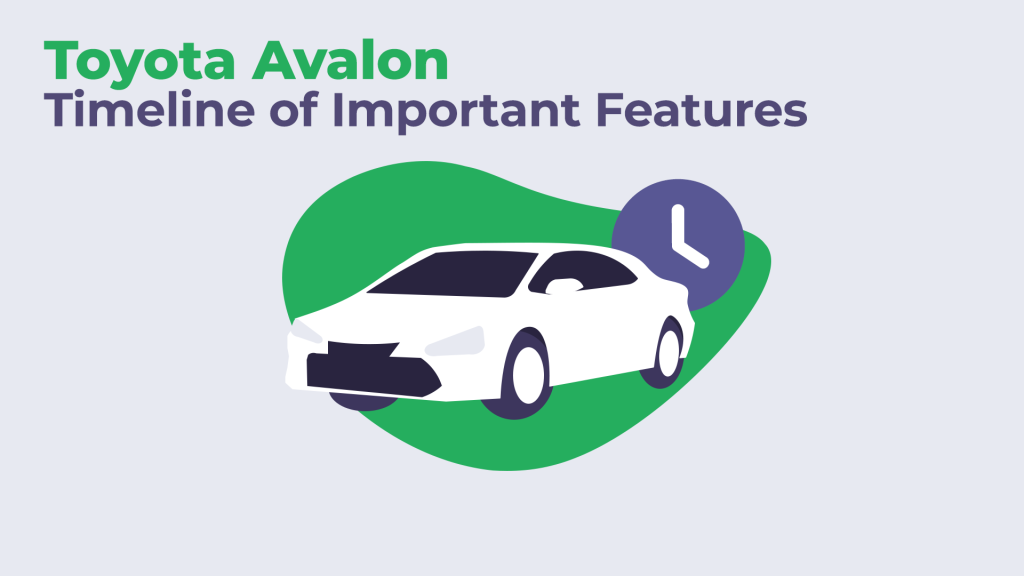
1996: No significant changes as the second model after the initial release
1997: More power and torque added to the engine lineup
1998: Newly standard side-impact airbags and pre-tensioner seatbelts with force limiters, updated taillamps, headlights, grille, and trunk lid design
1999: Newly released daytime running lights and dual-heated color-keyed power mirrors
2000: Release of the 2nd generation with the cabin becoming more spacious with updated styling
2001: New emergency trunk release added, Constellation Blue Pearl and Cognac Brown colors removed from the lineup
2002: XL receives a new package with power leather-trimmed seats, remote keyless entry, a JBL premium sound system, and 15” alloy wheels, Sport Luxury package includes 16” alloy wheels and a rear spoiler
2003: Refreshed styling has a new grille, redesigned bumpers and updated taillamps, newly released standard features include dual-stage airbags and child safety anchor points
2004: Base models include optional stability and traction control
2005: 3rd generation models come with a more powerful V6 engine and additional cabin space
2006: Stability control expands to include the XL and Touring trims, keyless startup now comes standard
2007: Remains mainly unchanged except for newly available tire pressure sensors and a navigation system on the Touring trim
2008: Midcycle refresh adds a six-speed automatic transmission to replace the previous five-speed, standard features include updated headlamps and a restyled keyless remote
2009: Newly standard safety features include active headrests and stability control
2010: Receives standard rear-passenger auto up/down windows
2011: New front and rear-end styling, trim levels reduced to just the base, and Limited models
2012: Remains mostly unchanged
2013: Start of 4th generation with a full redesign
2014: Minor shuffling of standard and optional features
2015: XLE Touring Sport trim added to the lineup, available Entune infotainment system upgraded, paddle shifters become standard equipment
2016: Touring trim includes a sport-tuned suspension, XLE Plus trim released between the base and XLE Premium, Touring Sport trim dropped from the lineup
2017: Toyota Safety Sense Package becomes standard equipment, including adaptive cruise control, forward collision warning, lane departure warning, automatic high-beam headlights, and automatic pre-collision braking
2018: Remains mostly unchanged
2019: Start of the 5th generation includes a complete redesign, including standard Apple CarPlay
2020: TRD trim debuts, Android Auto becomes standard equipment
2021: All-wheel drive available on select models, TRD and Nightshade Edition trims earn high-performance tires
2022: TRD model discontinued, all-wheel drive is removed from the lineup
The Best Years of the Toyota Avalon
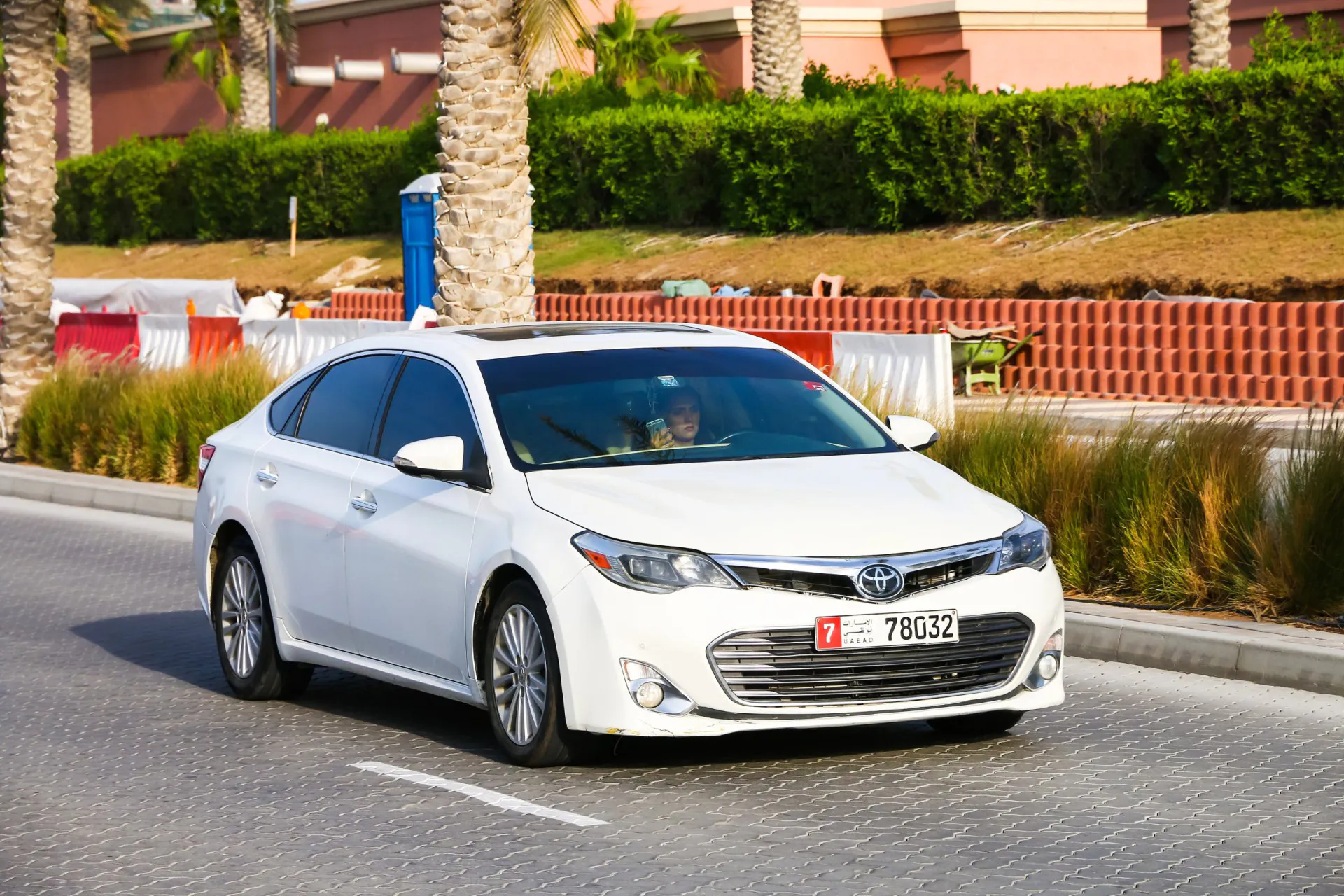
To find the best Toyota Avalon models, we combined the information about Owner Information Scores and FIXD Reliability Ratings. We back up this information with average cost of ownership scores, fuel economy ratings, safety scores, and the most common trouble code data. There’s also a section that discusses recalls from the National Highway Traffic Safety Administration (NHTSA), giving you more information on which models may be best.
Among this Best & Worst Toyota Avalon list, we’ve removed the 2010, 2017, and 2018 models due to a lack of data. If we had received a few more respondents, the ratings might be dramatically different, so it’s best to exclude them. If you are still interested in one of these models, group it with the models closest to it for an accurate determination of how it might rate.
2019-2020 Toyota Avalon
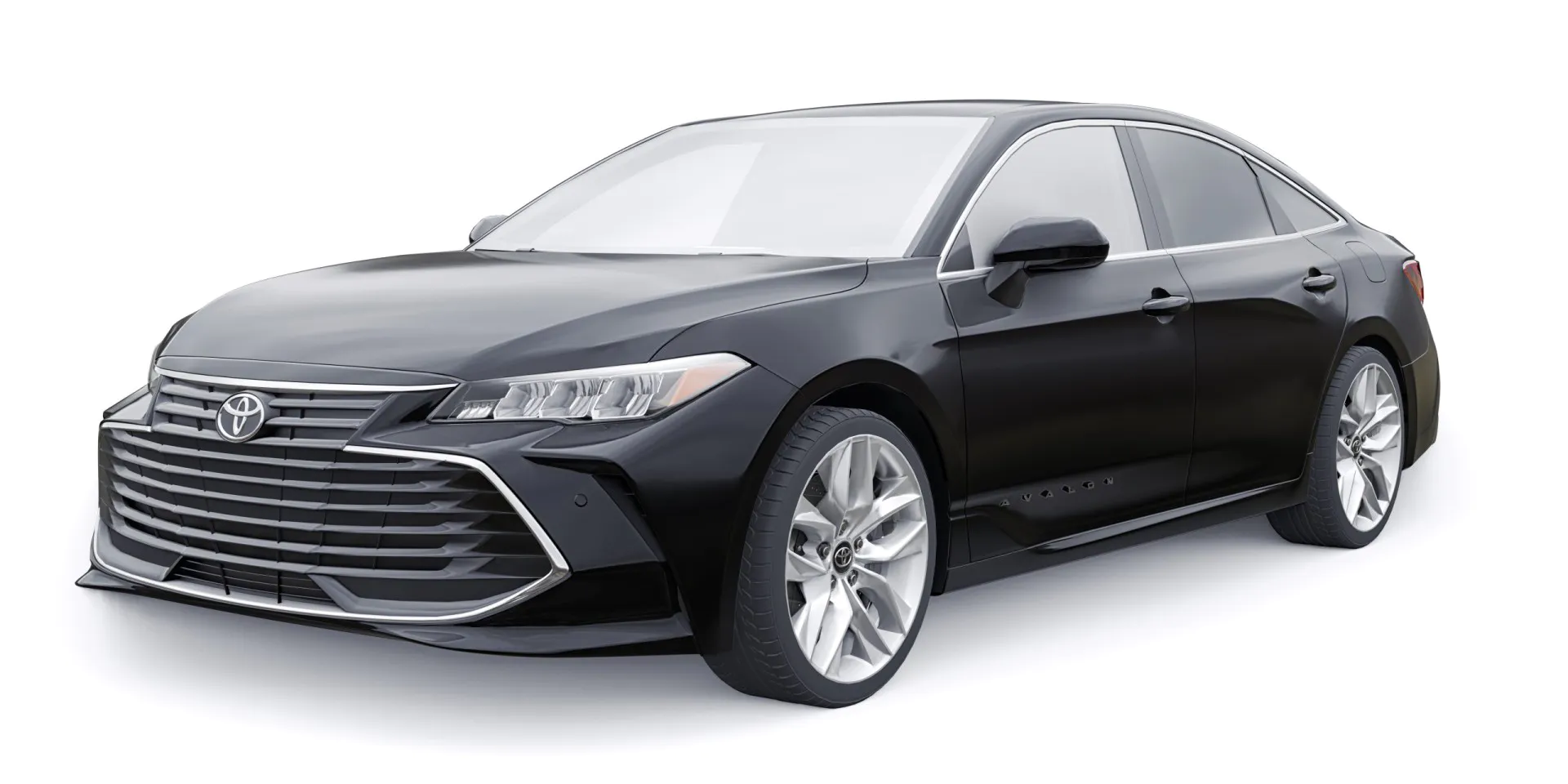
FIXD Reliability Score: 6-9/10
Owner Reliability Score: 6-10/10
KBB Value: $27,692-$28,073
Fuel Economy: 26 mpg (gas), 44 mpg (hybrid)
Annual Maintenance/Repair: $250
Safety Rating: 4.4/5
The 5th generation Toyota Avalon models have the best ratings and the lowest cost of ownership, proving they are worth every penny that they cost.
The Owner Reliability score of the 2020 Toyota Avalon is a perfect 10 out of 10, while the 2019 model earns 6 out of 10. With the FIXD Reliability score, the 2020 Toyota Avalon earns 9 out of 10, and the 2019 model continues with 6 out of 10.
Both Toyota Avalon models have a crash test rating of 4.4 (out of 5). While this is a good score, it does fall slightly below the average across the board.
For these model years, you can choose the gas-powered or hybrid Toyota Avalon. The gas model gets a decent rating of 26 mpg on average versus the hybrid at 44 mpg.
What’s most impressive is the average cost of ownership, rated at $250 for both models. Some of these sedans may be out of warranty or getting close, so the price may go up soon. Toyota offers a 3-year/36,000-mile limited warranty and 5-year/60,000-mile powertrain coverage. Still, owners aren’t reporting any increase in mechanical issues that include an elevated cost, so that’s good news.
The most common issue with the 2019 Toyota Avalon is the Lost Communication With ABS (U1117) code. There’s also a chance for the USB 1 Circuit (B124B) DTC and the Lost Communication With Navigation Control Module (U0163) code. With the 2020 Toyota Avalon, the most common code is the Low Power Supply Voltage Malfunction (C1241) DTC. It also suffers from the Cylinder 4 Misfire (P0304) DTC and the Coolant Thermostat Temperature Below Regulating Temperature (P0128) code. These causes can range from minor to major, so it’s best to consult a mechanic for more information.
The 2019 Toyota Avalon has four open recalls. Even better, the 2020 Toyota Avalon only has two recalls.
2015-2016 Toyota Avalon
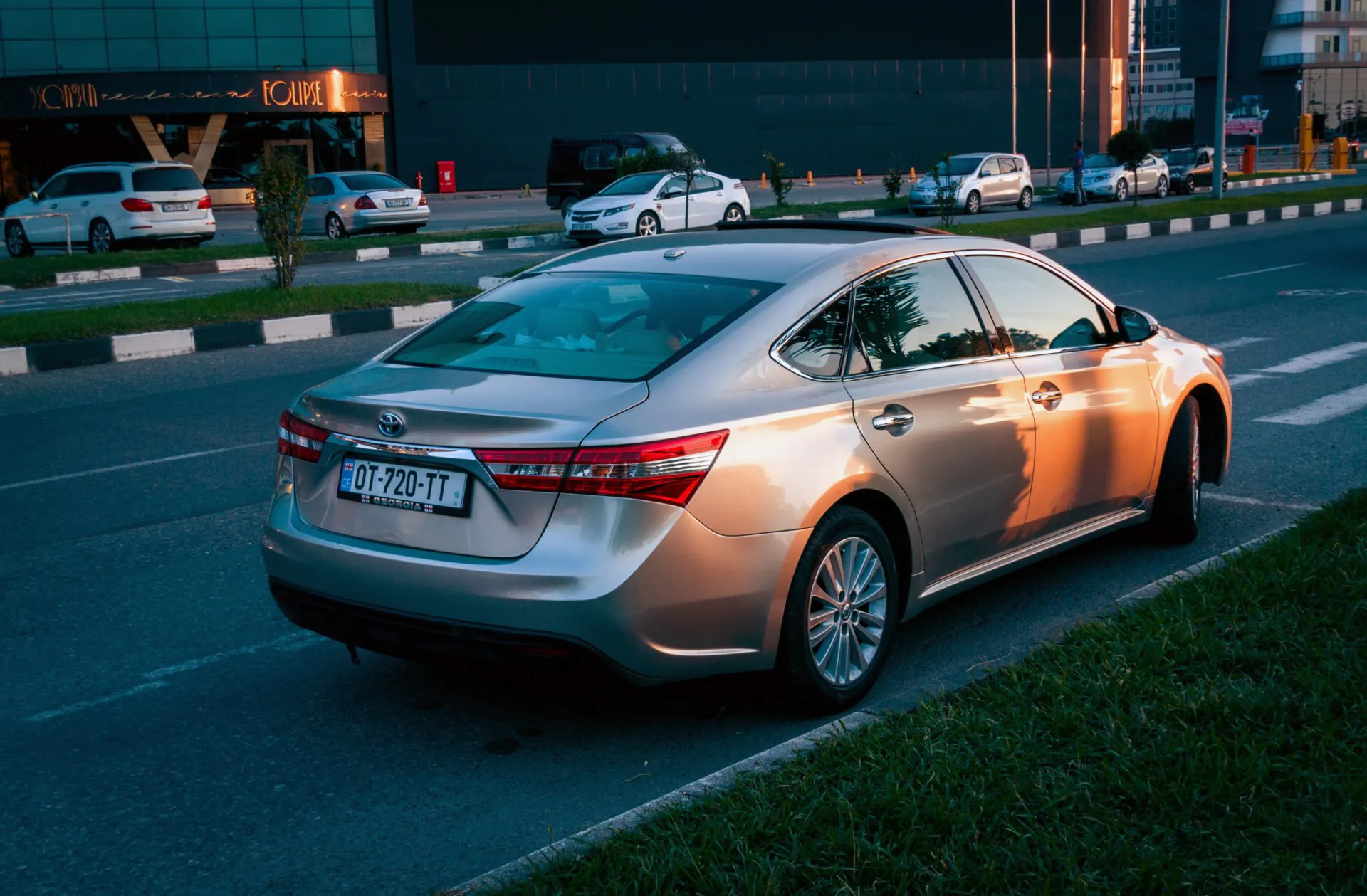
FIXD Reliability Score: 5-7/10
Owner Reliability Score: 7-9/10
KBB Value: $10,706-$12,221
Fuel Economy: 24 mpg (gas), 40 mpg (hybrid)
Annual Maintenance/Repair: $250
Safety Rating: 4.4-4.6/5
These two Avalon models maintain decent reliability scores but are better known for the low cost of ownership and a lack of major mechanical issues.
The Owner Reliability score of the 2015 Toyota Avalon is 9 out of 10, while the 2016 model earns 7 out of 10. With the FIXD Reliability score, the 2015 Toyota Avalon earns 7 out of 10, and the 2016 model falls just slightly lower with 5 out of 10.
The 2015 Toyota Avalon model has a crash test rating of 4.4 (out of 5), which is just below average. However, the 2016 model earns a rating of 4.6 (out of 5), which is better.
For these model years, you can choose the gas-powered or hybrid Toyota Avalon. The gas model earns a rating of 24 mpg on average versus the hybrid at 40 mpg.
The cost of ownership with these two models is also $250 a year, which is worth talking about. Owners haven’t reported any increased chance of major mechanical repairs.
The most common issue with the 2015 Toyota Avalon is the Replace Hybrid Battery Pack (P0A80) code. This won’t be a problem with the gas-powered models. However, the 2015 Avalon also struggles with the Cylinder 3 Misfire (P0303) code. In some cases, a new ignition coil fixes the problem for $51 to $173. The most common concern with the 2016 Toyota Avalon is the Startability Malfunction (P1604) DTC. This one also occurs with the 2015 models. If the car needs a new fuel pump, you may spend $457 to $617. The 2016 model can also deal with the H02S2 Heater Control Circuit Low-Bank 2, Sensor 2 (P0057) code. It may even come up with the Engine Rough Idling (P1605) code. This problem may require a new EVAP Canister Pump Module, costing $200 to $560.
The 2015 Toyota Avalon shows two open recalls and three investigations. In comparison, the 2016 Toyota Avalon has three recalls but only one investigation.
2013-2014 Toyota Avalon
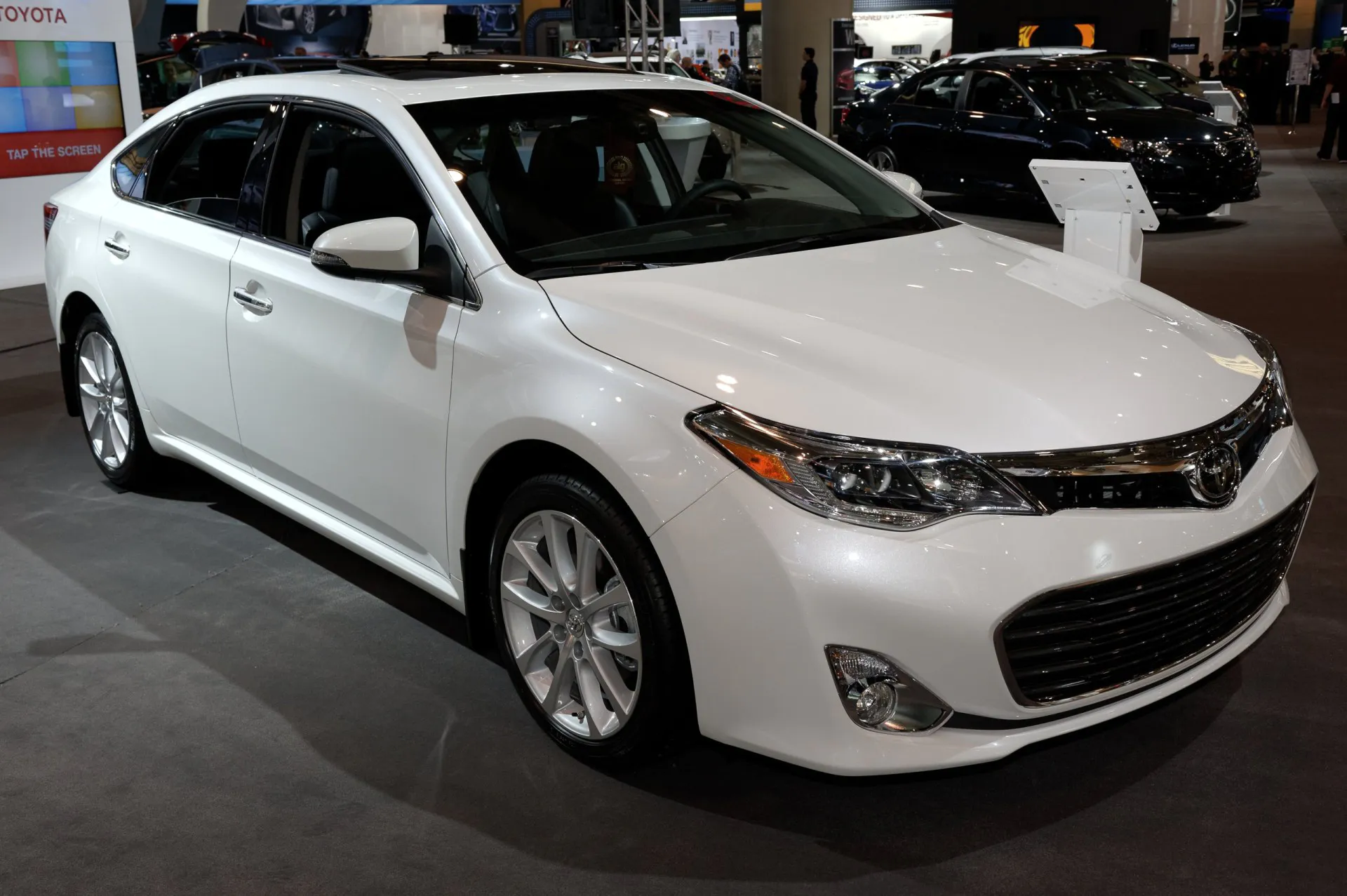
FIXD Reliability Score: 5/10
Owner Reliability Score: 10/10
KBB Value: $10,092-$11,148
Fuel Economy: 25 mpg (gas), 40 mpg (hybrid)
Annual Maintenance/Repair: $417-$679
Safety Rating: 4.6/5
The first two Avalon models of the 4th generation have great owner satisfaction scores and continue to need minimal repairs.
The Owner Reliability score of the 2013 and 2014 Toyota Avalon is 10 out of 10. With the FIXD Reliability score, these two models earn 5 out of 10.
Both the 2013 and 2014 Toyota Avalon models have a crash test rating of 4.6 (out of 5). This is above average, proving it’s a great car for a daily commute.
For these model years, you can choose the gas-powered or hybrid Toyota Avalon. The gas model earns a rating of 25 mpg on average versus the hybrid at 40 mpg.
The cost of ownership with these two models goes up just a little. The 2014 Avalon averages $417 a year, while the 2013 model sees an estimate of $679. Still, there are minimal reports of major mechanical needs.
The most common issue with both Toyota Avalon models is the Startability Malfunction (P1604) DTC. If the sedan needs a new fuel pump, you may spend $457 to $617. The other two common codes with the 2013 Avalon are System Too Lean – Bank 1 (P0171) and the Replace Hybrid Battery Pack (P0A80) code. With the 2014 Toyota Avalon, you may also deal with the No Signal from Transmitter ID 4 In Main Mode (C2124) and the No Signal from Transmitter ID 1 In Main Mode (C2121) codes, both of which have to do with the tire pressure monitoring system.
The 2013 Toyota Avalon shows four recalls and three investigations. In comparison, the 2014 Toyota Avalon has four recalls and one investigation.
2012 Toyota Avalon
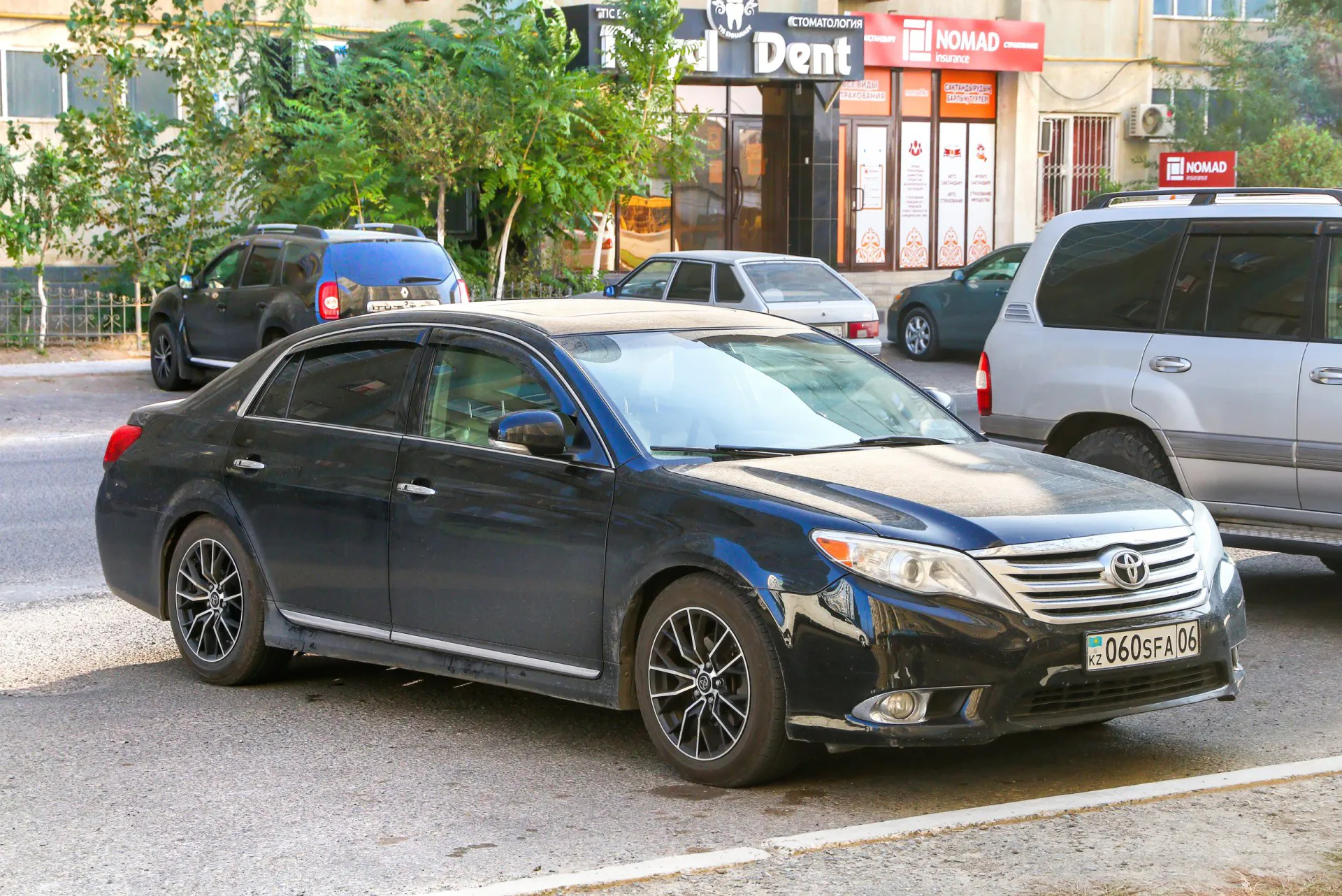
FIXD Reliability Score: 1/10
Owner Reliability Score: 9/10
KBB Value: $11,742
Fuel Economy: 22 mpg (gas)
Annual Maintenance/Repair: $500
Safety Rating: 4.0/5
The final Avalon model from the 3rd generation is our last choice as some of the best to choose from.
The Owner Reliability score of the 2012 Toyota Avalon is 9 out of 10. With the FIXD Reliability score, this Avalon earns 1 out of 10.
The 2012 Toyota Avalon models have a crash test rating of 4.0 (out of 5). Sadly, this model is also below average.
For this model year, you can only choose a gas-powered Toyota Avalon. This gas model earns a rating of 22 mpg on average.
Even though it’s more than a decade old, this Avalon still has a lower cost of ownership. The average works out to $500 a year, and the only increased chance of major repairs is with the brakes.
The most common issue with the 2012 Toyota Avalon models is the Startability Malfunction (P1604) DTC. This may pair with the Engine Stall History (P1603) DTC. For these problems, it’s possible to replace the fuel pump for $457 to $617. This sedan can also deal with the Camshaft Position Sensor “B” Circuit Bank 2 (P0390) DTC.
The 2012 Toyota Avalon shows four recalls and one investigation from the NHTSA.
The Worst Years of the Toyota Avalon

To pick the worst Toyota Avalon model years, we used the same data from our best choices. These sedans come with lower reliability scores and can cost a lot more to maintain or repair. This list begins with the worst possible model and works up to some that may still be an option if you don’t prefer the others.
2001-2004 Toyota Avalon
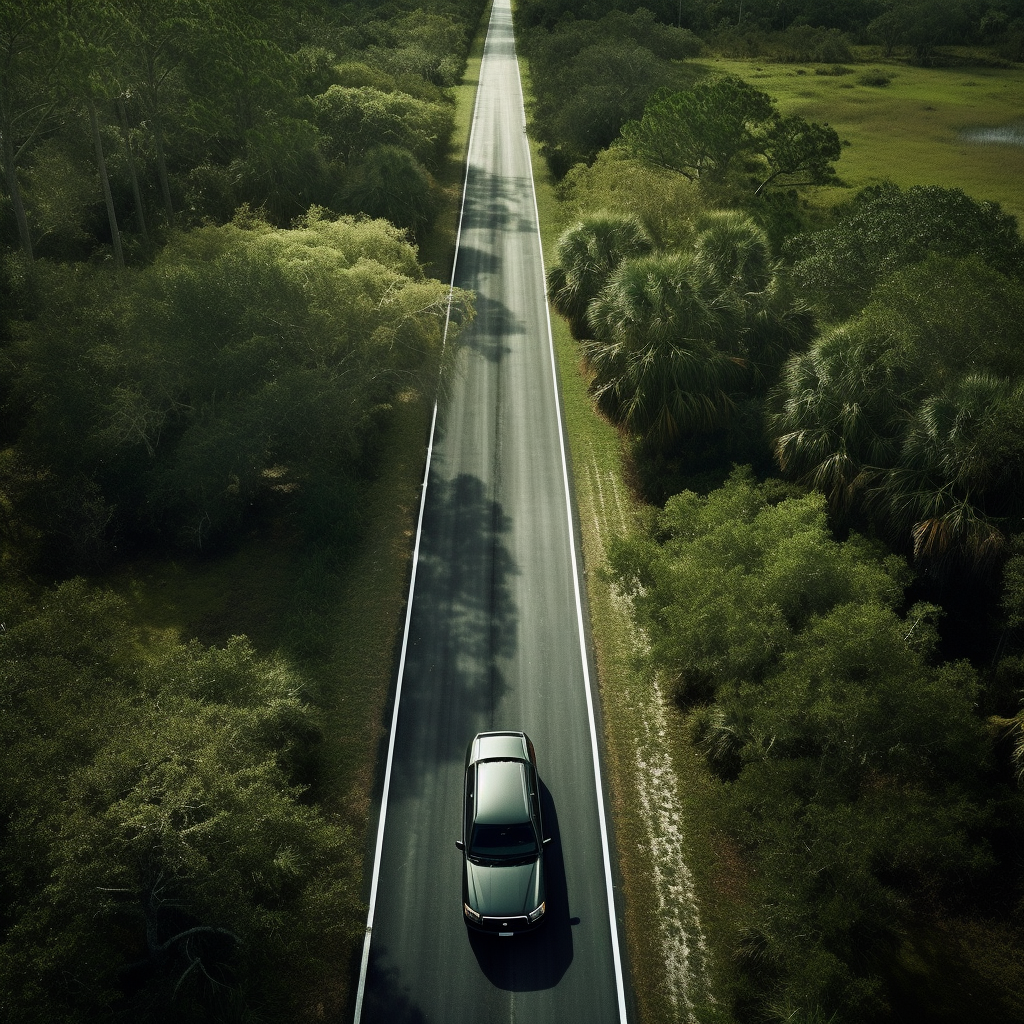
FIXD Reliability Score: 1-2/10
Owner Reliability Score: 6-8/10
KBB Value: $2,009-$2,991
Fuel Economy: 21-22 mpg (gas)
Annual Maintenance/Repair: $450-$750
Safety Rating: 4.2-4.4/5
These 2nd generation Avalon models suffer from extensive engine repairs and several other mechanical issues.
The Owner Reliability score of the 2001 Toyota Avalon is 7 out of 10, with the 2002 Avalon ranked at 6 out of 10. Both the 2003 and 2004 Toyota Avalon models have a ranking of 8 out of 10. With the FIXD Reliability score, the 2001 and 2002 Avalon earned 1 out of 10, while the 2003 and 2004 models are ranked 2 out of 10.
The 2001 Toyota Avalon models have a crash test rating of 4.25 (out of 5), while the 2002 Avalon ranks 4.2 (out of 5). Both of these scores are above average for the time. Both the 2003 and 2004 Toyota Avalon rank 4.4 (out of 5).
For these model years, you can only choose a gas-powered Toyota Avalon. This 2001 Toyota Avalon earns a rating of 21 mpg on average, while the other three get 22 mpg on average.
The cost of ownership of the 2001 Toyota Avalon is just $450 a year. Yet, the other models rise to more. The 2002 Toyota Avalon averages $607 a year, while the 2003 model is rated at $667 a year. Finally, the 2004 Toyota Avalon shows an average of $750 a year. Yet all four models suffer from expensive engine repairs. Additionally, the 2002 and 2003 Toyota Avalon also deal with transmission and brake issues, while the 2001 model deals with an increase in AC/Heat problems, and the 2004 model isn’t immune to fuel system trouble.
Many of the common problems between these models are related to each other. The 2001 and 2002 Avalon models show the Evaporative Emission Control System Malfunction (P0440) code, while the 2003 and 2004 models have the Evaporative Emissions Control System Leak – Medium (P0442) code. Additionally, the 2001 to 2003 Avalon sedans suffer from the Evaporative Emission Control System Vent Control Circuit Malfunction (P0446) code, while the 2004 Toyota Avalon shows an increased chance of the Evaporative Emissions Control System Leak – Small (P0456) DTC. These problems could require a new charcoal canister, costing $753 to $1,000, or a new fuel filler cap averaging $58 to $165. Even more importantly, the 2001 Toyota Avalon suffers from the Random, Multiple Misfire Detected (P0300) code that could require a new Variable Camshaft Timing (VCT) Solenoid, averaging $1,016 to $1,531. At this point, the used Avalon may not be worth fixing.
The 2001 Toyota Avalon has two recalls, while the 2002 Toyota Avalon shows one recall. The 2003 Toyota Avalon and 2004 Toyota Avalon have three recalls showing.
2011 Toyota Avalon
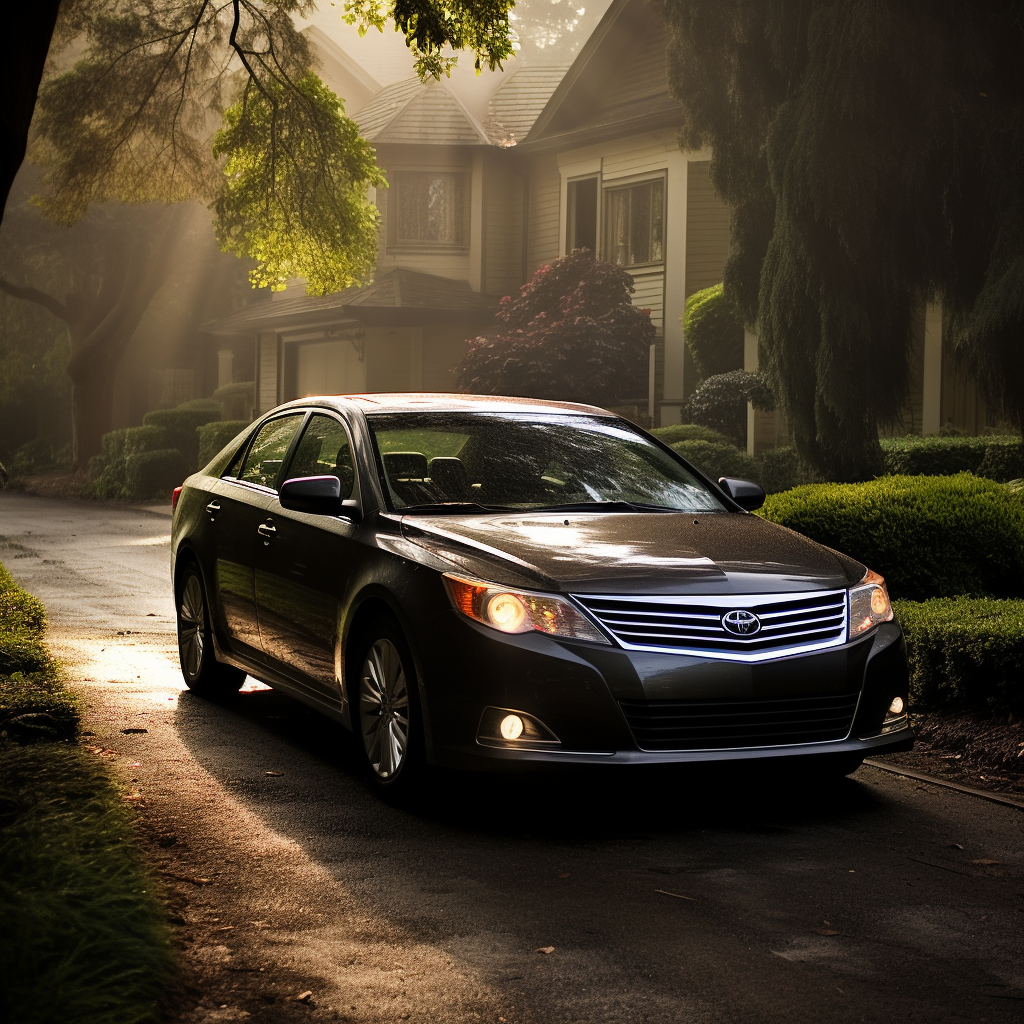
FIXD Reliability Score: 5/10
Owner Reliability Score: 9/10
KBB Value: $8,924
Fuel Economy: 23 mpg (gas)
Annual Maintenance/Repair: $350
Safety Rating: 4.0/5
The 2011 Toyota Avalon is considered one of the worst because of how many different systems can suffer from mechanical trouble.
The Owner Reliability score of the 2011 Toyota Avalon is 9 out of 10. With the FIXD Reliability score, the 2011 Avalon earns 5 out of 10.
The 2011 Toyota Avalon models have a crash test rating of 4.0 (out of 5). While that may seem low, it falls in line with the averages.
For the 2011 model year, you can only choose a gas-powered Toyota Avalon. This 2011 Toyota Avalon earns a rating of 23 mpg on average.
The cost of ownership of the 2011 Toyota Avalon is just $350 a year. But there are some serious issues worth discussing. This Toyota sedan shows a higher chance of expensive engine, transmission, fuel system, AC/heat, and brake troubles.
The biggest problem with the 2011 Avalon is the Startability Malfunction (P1604) DTC. This may show up at the same time as the Engine Stall History (P1603) DTC. Sometimes, a new fuel pump fixes the problem, costing $457 to $617. It can also suffer from the Catalyst System Efficiency Below Threshold (P0420) trouble code. If you need to replace the catalytic converter, you could spend $1,538 to $2,041.
On the bright side, the 2011 Toyota Avalon only has one open recall.
2007-2009 Toyota Avalon

FIXD Reliability Score: 1-6/10
Owner Reliability Score: 6-10/10
KBB Value: $5,316-$6,135
Fuel Economy: 22-23 mpg (gas)
Annual Maintenance/Repair: $583-$857
Safety Rating: 4.8/5
The 2007 to 2009 Toyota Avalon may not suffer from a lot of engine or transmission issues, but the expensive brake repairs are overwhelming.
The Owner Reliability score of the 2007 Toyota Avalon is 6 out of 10, with the 2008 model ranking 8 out of 10 and the 2009 Avalon earning 10 out of 10. With the FIXD Reliability score, the 2007 Avalon earns 1 out of 10, with the 2008 model ranking 5 out of 10, and the 2009 Avalon earning 6 out of 10.
The 2007 to 2009 Toyota Avalon models have a crash test rating of 4.8 (out of 5). It doesn’t get better than this.
For these three model years, you can only choose a gas-powered Toyota Avalon. This 2008 Toyota Avalon earns a rating of 22 mpg on average, while the other two are rated for 23 mpg.
The cost of ownership of the 2008 Toyota Avalon is $583 a year. The 2009 model averages $650, while the 2007 is rated for $857 a year. While the three models may all suffer from expensive brake repairs, the 2007 Avalon also seems to struggle with the fuel system.
The biggest concern with the 2007 Toyota Avalon is the Catalyst System Efficiency Below Threshold (P0420) trouble code. If you need to replace the catalytic converter, you could spend $1,538 to $2,041. The 2008 model seems to struggle most often with the Exhaust Camshaft Timing- Over-Advanced Bank 1 (P0014) code. For this, you may need a new engine oil filter, costing $62 to $174. With the 2009 Toyota sedan, you may notice the H02S2 Heater Control Circuit Low-Bank 2, Sensor 2 (P0057). Oftentimes, this requires a new heated oxygen sensor, costing $153 to $306. Additionally, all three models deal with random misfiring codes (P0300, P0302, and P0303). For all, it may be a bad ignition coil, costing $53 to $173.
The 2007 Toyota Avalon has six recalls, while the 2008 Toyota Avalon also shows six recalls. In comparison, the 2009 Toyota Avalon has seven recalls.
2005-2006 Toyota Avalon
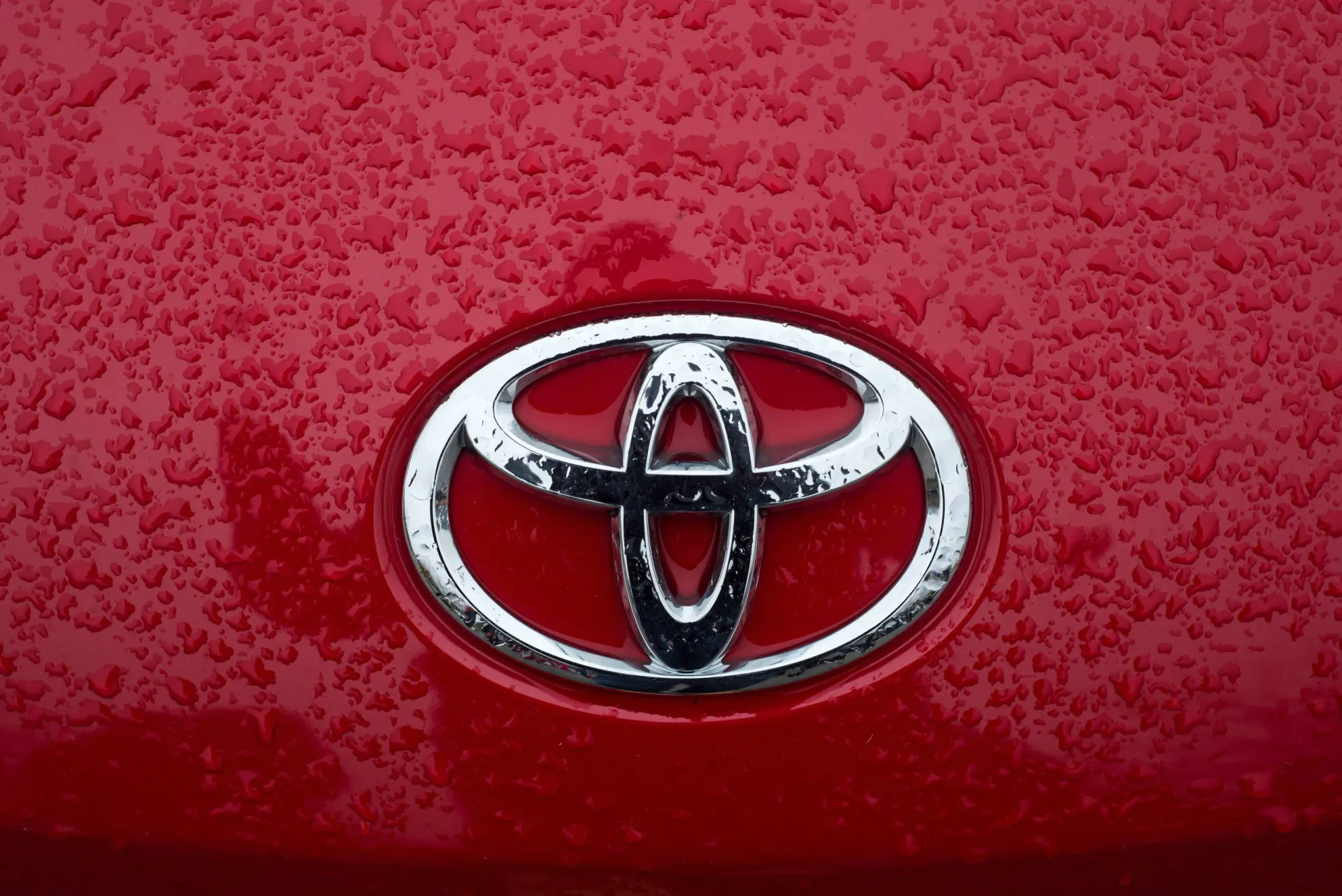
FIXD Reliability Score: 1-3/10
Owner Reliability Score: 7-8/10
KBB Value: $2,178-$4,567
Fuel Economy: 22-23 mpg (gas)
Annual Maintenance/Repair: $563-$650
Safety Rating: 4.8/5
One major repair with the 2005 and 2006 Toyota Avalon, and it may not be worth keeping, which is why it’s sitting at the bottom of our worst list.
The Owner Reliability score of the 2005 Toyota Avalon is 7 out of 10, with the 2006 model ranking 8 out of 10. With the FIXD Reliability score, the 2005 Avalon earns 3 out of 10, and the 2006 sedan ranks 1 out of 10.
The 2005 and 2006 Toyota Avalon models have a crash test rating of 4.8 (out of 5). This is a great rating for the older sedans.
For these two model years, you can only choose a gas-powered Toyota Avalon. This 2005 Toyota Avalon earns a rating of 22 mpg on average, while the 2006 Avalon is rated for 23 mpg.
The cost of ownership of the 2005 Toyota Avalon is $650 a year. The 2006 model averages $563, but they both have their own set of issues. You may need to deal with expensive brake repairs with the 2005 Avalon, while the 2006 model shows a higher chance of AC/heat trouble.
The biggest issue with the 2005 Toyota Avalon is the Catalyst System Efficiency Below Threshold (P0420) trouble code. If you need to replace the catalytic converter, you could spend $1,538 to $2,041. There’s also a chance for the Random, Multiple Misfire Detected (P0300) code and the Cylinder 2 Misfire (P0302) DTC. Either of these could be showing a bad ignition coil, costing $53 to $173. The biggest trouble with the 2006 Toyota Avalon is the Evaporative Emission Control System Incorrect Purge Flow (P0441) code. This could be related to the other common code, the Evaporative Emissions Control System Leak – Small (P0456) DTC. These problems could require a fuel filler cap averaging $58 to $165.
Both the 2005 Toyota Avalon and 2006 Toyota Avalon have seven recalls.
FAQs
What years of the Toyota Avalon have engine and/or transmission problems?
According to our data, the 2001-2004 and 2011 Toyota Avalon models deal with more expensive engine repairs. There’s also a higher instance of transmission repairs with the 2002-2003 and 2011 sedans.
What is considered high mileage for a Toyota Avalon?
The Toyota Avalon is considered a reliable car for many model years. Still, it can be challenging to determine how long it will last without having information on the maintenance history and driving style. If it hasn’t missed any service, the Toyota Avalon could easily see 175,000 miles or more.
Based on our data, a high-mileage Toyota Avalon could be considered anything over 140,000 miles.
The 2003 Toyota Avalon has the highest mileage in our surveys at 183,000 miles, but most sedans don’t go that far. If you choose to buy a high-mileage Avalon, expect a lower resale value.
Do any hybrid years have problems?
A hybrid engine was offered starting in the 2013 Toyota Avalon. It continued with the lineup until the Avalon stopped being produced. While we haven’t seen any major troubles with the engine, we have noticed a higher instance of the Replace Hybrid Battery Pack (P0A80) code on older models. This is to be expected as a hybrid sedan starts to age.
What other vehicles should I consider?
If you don’t want a used Avalon, you may also consider the Toyota Corolla or Toyota Camry, which are the brand’s other sedans. Otherwise, you could look at the comparable Lexus model (made by the same company), which would be the Lexus ES. There’s also the new Toyota Crown, which took the place of the Avalon. Or, you could look at the competition with the Nissan Maxima, Ford Taurus, Kia Cadenza, Chrysler 300, Chevy Impala, Buick LaCrosse, or Volvo S90.
If you are okay with jumping into an SUV, Toyota has plenty to choose from. Take a closer look at the Toyota Venza, Toyota 4Runner, Toyota Corolla Cross, Toyota RAV4, or Toyota Highlander.
What owners of the Toyota Avalon like to use their car for:
Percent based x/5-star: 0-10% = 1, 11-20% = 2, 21-30% = 3, 31-40% = 4, 41%+ = 5
| Frequent Use Categories: | How Useful? (Out of 5 Stars) |
| Family Vehicle | ***** |
| Lots of Driving (travel/long commute) | *** |
| Hauling/Towing | * |
| Office on Wheels | * |
| Sport/Fast Driving | * |
| Luxurious Driving | ** |
| Outdoor/Off-Road | * |
A Note About Data and Information Sources
This article has many details about Toyota Avalon’s reliability; here’s what we used for our assumptions and recommendations.
- FIXD Reliability Score & Data: Engine reliability information is captured via the FIXD App.
The FIXD Reliability Score is calculated using the number of DTCs per year, weighted by mileage. This is then turned into a scale of 1-10 for easy graphing.
This is an objective score.
- Owner Reliability Score & Data: This data is the result of surveying Toyota Avalon owners who use FIXD.
The Owner Reliability Score comes straight from owners of the Toyota Avalon.
This is a subjective score.
To determine the Owner Reliability Score we ask each car owner:
How reliable would you say your Toyota Avalon is?
a. Just point A to point B driving
b. A Daily Commuter
c. Good for a 100-mile road trip
d. Good for a 500-mile road trip
e. I could take a cross-country road trip, no problem
From here we translate their answers into the Owner Reliability Score:
a. = 2
b. = 4
c. = 6
d. = 8
e. = 10
Keep in mind, owners may think their car is more or less reliable than it actually is.
One potential problem is that people often buy the same make or model they are used to when they go car shopping, just a newer year.
Ford, for instance, has a number of consumer loyalty awards for the Ford F-Series, Ford Mustang, and Ford Expedition.
Car owners may be so loyal to the make or model they currently own that they would have trouble accurately comparing their cars’ reliability to others.
It’s for this reason that we ask car owners a question that is relative to mileage rather than relative to other cars.
Still, be mindful of the accuracy of these Owner Reliability Scores, people’s perceptions and unconscious blindspots can skew data.
We suggest looking at both the FIXD Reliability Score and the Owner Reliability Score for this reason.
- KBB Value: Average private-seller valuations as supplied by Kelley Blue Book (KBB), based on a Toyota Avalon with typical mileage for that respective model year.
- Fuel Economy: Mileage-per-gallon estimates according to the EPA MPG on Fueleconomy.gov
- Annual Maintenance/Repair: Upkeep expenses as reported by surveyed Toyota Avalon owners
- Safety Rating: Crash test data collected and reported by NHTSA. We average all ratings for each year to come up with a simplified, average safety score. This makes it easier to look at on a graph.
References
- Toyota Avalon, wikipedia.org. Retrieved August 17, 2023, from https://en.wikipedia.org/wiki/Toyota_Avalon
- Toyota Avalon reviews, edmunds.com. Retrieved August 18, 2023, from https://www.edmunds.com/toyota/avalon/
- Toyota Manuals & Warranties, toyota.com. Retrieved August 21, 2023, from https://www.toyota.com/owners/resources/warranty-owners-manuals

Brian Jones owns a used car dealership outside of Dallas, Texas. He has also worked for decades as an ASE Certified Master Technician for a variety of new car dealerships. Now he spends his time consulting dealerships and writing for some renowned publications, such as Motor1 (https://www.motor1.com/info/team/brian-jones/). When he’s not working, he’s tinkering around with pickup trucks and traveling with his family.

